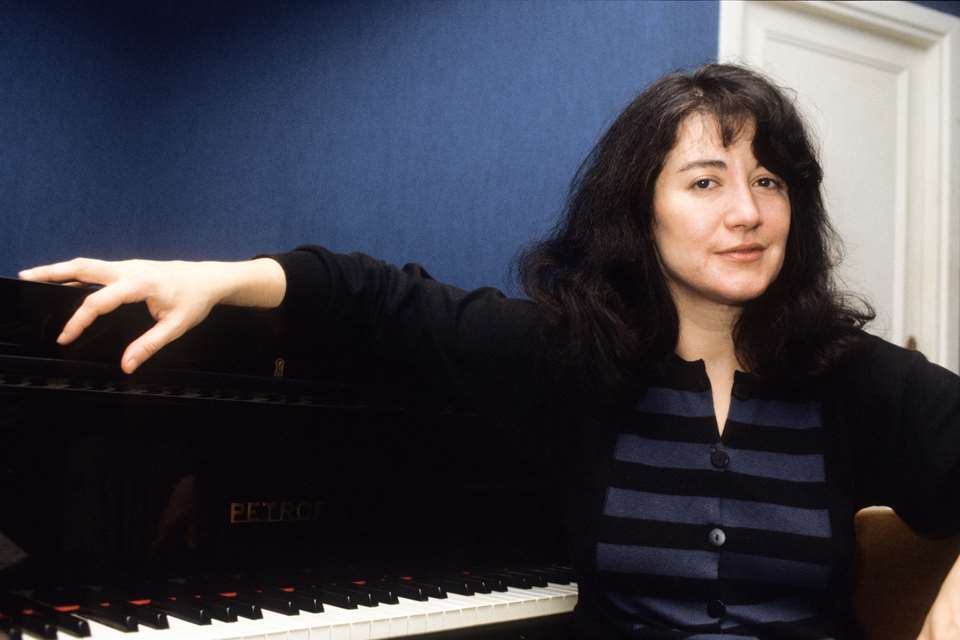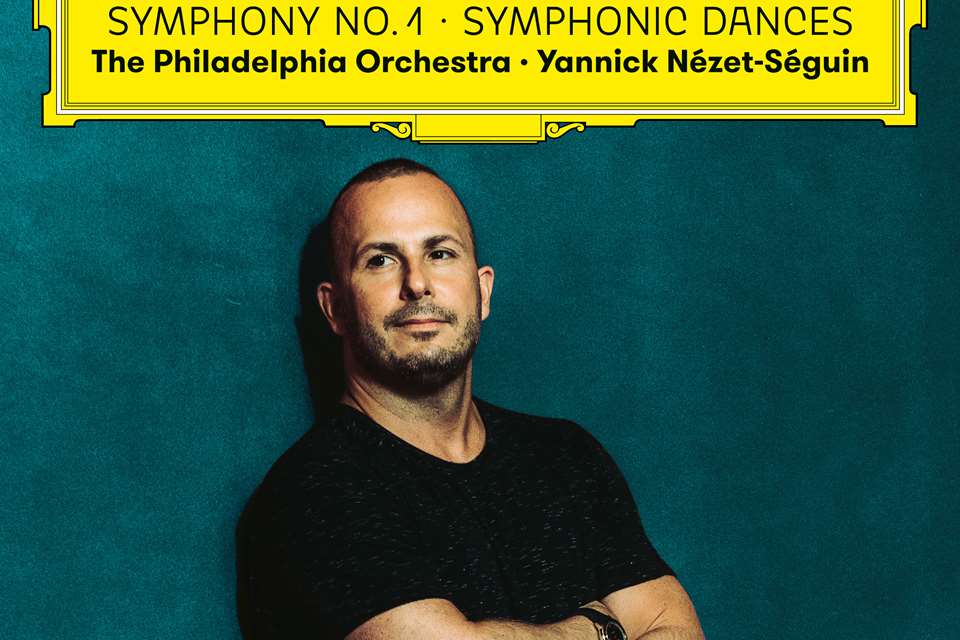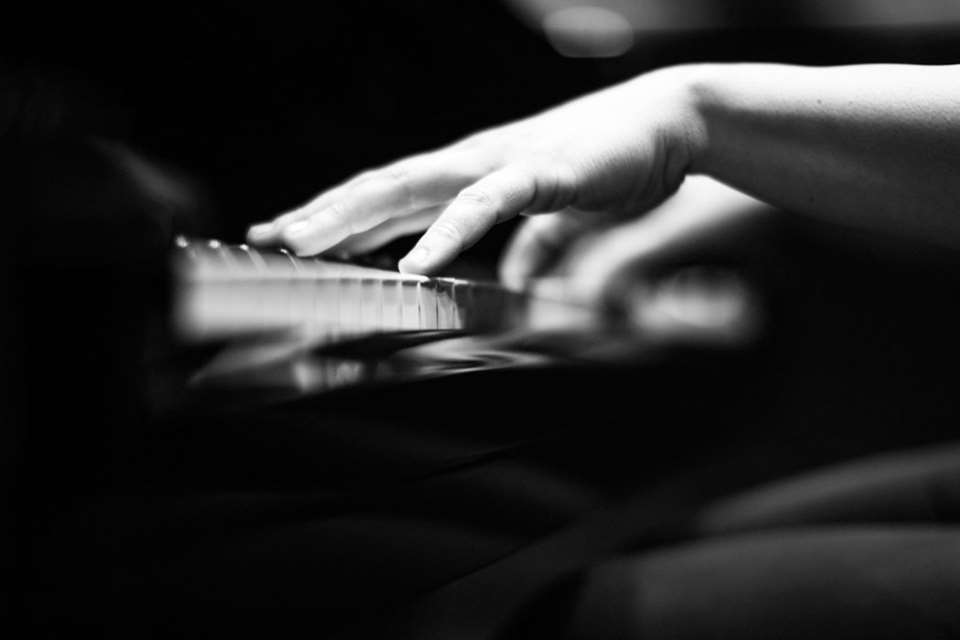Martha Argerich: Celebrating the Great Pianist at 80
Tim Parry
Thursday, June 24, 2021
At 80, Martha Argerich’s fire still burns brightly and her playing is as fresh and inventive as ever. Tim Parry speaks to some of her friends and colleagues to get a sense of what makes her so unique
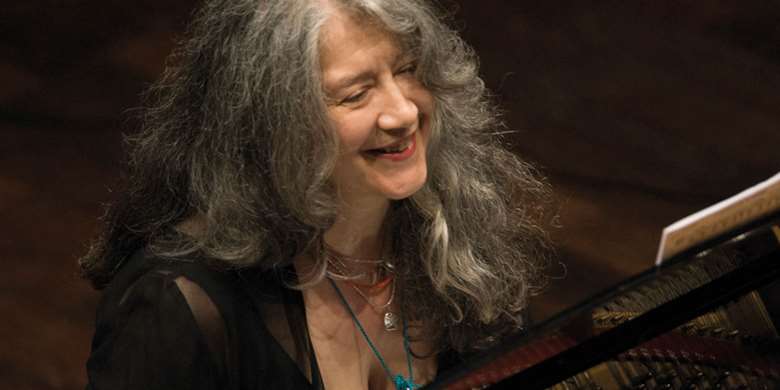
Can Martha Argerich really be 80? Sure enough, her contemporaries – the pianists we grew up with – are reaching similar milestones: Brendel turned 90 a few months back, Ashkenazy has passed 80, Barenboim does so next year. But there is something eternally youthful about Argerich, which may in part be down to the very human qualities we perceive in her personality – and a smile that charms now just as it did when she was younger – but fundamentally stems from her piano-playing. Brendel retired at the age of 77, while Ashkenazy and Barenboim have long been more prominent on the conductor’s podium. Argerich, uniquely, still plays the piano with the energy and effervescence that have defined her music-making for as long as we can remember.
It is well known that Argerich rarely gives interviews. Those close to her seem surprised that this is an issue – the Martha they know thrives on being around people and loves talking about music. A pre-planned interview is a different matter, of course, and she doesn’t enjoy talking about herself. In any case, travel restrictions earlier this year put paid to any realistic hope of talking with her, and I needed to decide how best to approach writing about someone already so written about.
One thing in my favour is that everyone wants to talk about her. It is hard to think of a more universally loved and respected musician. With this in mind, it seemed natural to speak to those who know Argerich well, but I was also keen to get an impression of her wider influence and importance from a range of younger colleagues, some of whom have not met her but all of whom have grown up knowing her playing. Detailed biographical and discographical information exists elsewhere, including Bryce Morrison’s summary in his feature for Gramophone (1/95), although the only actual biography is in French.
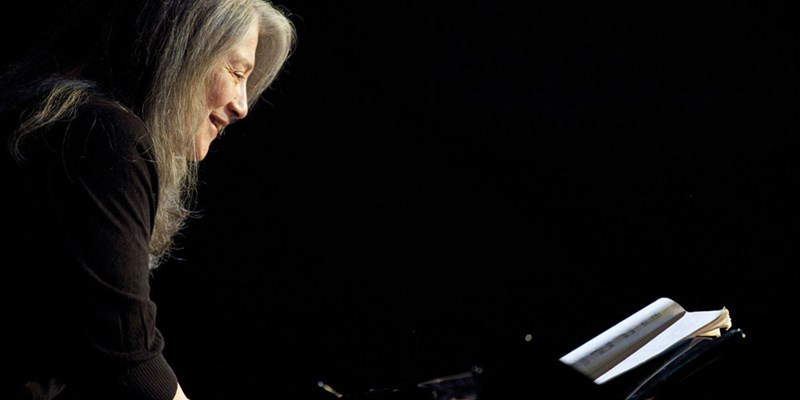
Ageless: although she worries about memory lapses, Argerich’s technique remains intact
I also spoke to Argerich’s eldest daughter, Lyda Chen. In 1963, following an unsatisfactory period of study with Arturo Benedetti Michelangeli, a mismatch of personality and outlook that it seems yielded just four lessons in 18 months, Argerich moved to New York, where she tried unsuccessfully to meet and study with Horowitz. Around this time, aged 21, she stopped playing the piano altogether, became pregnant by a friend, the composer and conductor Robert Chen, hastily married but separated before Lyda was born. Lyda grew up seeing little of her famous mother, spending short periods with her from the age of 12, and only really got to know her from the age of 17. By this time Argerich had two further daughters – Annie Dutoit (father Charles Dutoit) and Stéphanie Argerich (father Stephen Kovacevich). Lyda joined a full house, and as she puts it, ‘I got to know Martha as a woman but not as a mother, at least not until much later’. Lyda took a law degree, before focusing on her studies as a violinist and then a viola player. You can hear her on several ‘Argerich & Friends’ recordings live from the Lugano Festival.
When talking about Argerich with different musicians, both those who know her and those who don’t, some themes inevitably recur: her virtuosity, in the fullest sense; her heat-of-the-moment music-making and willingness to take risks; her humility and generosity, notably of course towards younger colleagues; and above all – and this is frequently misunderstood – her capacity for hard work.
‘It’s like the piano is an extension of her. For me, these are the most natural hands for the piano that exist’ – Bertrand Chamayou
It is difficult to think of Argerich and not think about virtuosity. From her 1960 debut album (DG, 1/63), made when she was 19, which drew the admiration of Horowitz and alerted everyone to an extraordinary technique and temperament, and her free-spirited Chopin at the 1965 International Chopin Competition in Warsaw, which she won seemingly without breaking sweat despite having only recently returned to the instrument after her New York sojourn and Lyda’s birth, Argerich’s early playing is notable for the creative tension that comes with pushing the music beyond any safety net. Among the most famous examples of this flair and tempestuousness are her studio recording of Liszt’s B minor Sonata (DG, 6/72) and her various accounts of Ravel’s Gaspard de la nuit, most strikingly the live performance from Amsterdam’s Concertgebouw in 1979 (EMI/Warner, 2/01), where you almost have to remind yourself to breathe.
Our view of Argerich may be grounded in the exhilaration of her early career, but the musicians I speak with focus initially on her more recent playing. Benjamin Grosvenor says: ‘I think what’s so remarkable is how she’s playing now, how she has played in the past decade. There are a lot of pianists who as they get older lose the freshness they had when they were younger, but with Argerich, even when she’s playing the same pieces in public, every time she manages to find new things to say. And the fact that she hasn’t lost any of her technical facility is testament to the most relaxed, unlimited technique that you could imagine.’ Stephen Hough agrees: ‘She just does not seem to age. It’s almost uncanny. It’s not just that she’s playing well at the age of 80, which of course she is, it’s that she’s playing with no sense of losing the spark that she had when she was 20, and that seems to me to be absolutely unique. Many artists play fantastically when they’re 80, and actually better than when they were young, but it’s a different kind of style. Horowitz found other ways to do things, and in music like Scriabin he was deeper and more interesting when he was older. Cherkassky was another, playing fantastically at 80, but again his playing became slightly different. With Argerich you don’t feel that there is any fundamental difference in what she can do now compared to when she was younger.’
Nelson Goerner describes Argerich as an ‘eternal youngster’. Goerner has known Argerich since he was 16, when in 1986 she returned to Argentina for the first time in 14 years to play three concertos in a single concert (Liszt’s First Concerto, Beethoven’s Second and Prokofiev’s Third). She met some of the most promising pianists of the new generation and, impressed by Goerner, arranged for a scholarship that accelerated his move to Europe. Goerner won the Geneva Competition in 1990, became friends with Argerich, and has performed with her many times in two-piano recitals. Echoing Hough, he observes that ‘many pianists who play with a lot of fire bring a different kind of intensity as they get older. The primary drive and fire take a secondary place. With Martha this hasn’t happened: she has added more variety to her playing, but this fire remains.’
Lyda Chen tells me her mother can hardly believe that she’s almost 80. ‘Age is about how you feel,’ she says. ‘Physically, maman [as she affectionately calls Argerich throughout] feels quite well, and she is surprised by her pianistic capacity. She has reached the conclusion that from the elbows to the tips of her fingers her body hardly seems to age. She still has a lot of muscle tone.’
Even when Argerich can’t quite match the adrenalin and astonishing reflexes of her youth, she brings other facets to her playing. That she still performs Liszt’s First Concerto at all is extraordinary, given the rapid octaves, treacherous leaps and general athleticism, yet whereas many years ago she would blaze with vitality and daredevil velocity, she now brings a more subtle playfulness to this music without undermining any of its brilliance.
Hough also draws attention to Argerich’s control of colour. ‘For me’, he says, ‘what impresses most is the subtlety and finesse she brings to, say, a piece of chamber music or a Chopin mazurka. Many pianists can play all the Chopin Études without dropping a note, but what Argerich has is this range of colour, her use of the pedal, and a sense of beauty of sound that is quite unique.’ Lise de la Salle – who has not met Argerich but grew up with her playing as a constant source of inspiration – singles out the same characteristic. ‘Sound is so important,’ she begins; ‘I’m fascinated by the colours she can create, especially in piano and pianissimo, brilliant but tender, like a diamond, sharp but still warm.’
Examples clamour for inclusion. In Schumann’s Kinderszenen (DG, 3/84), her ‘Träumerei’ has a freedom without losing the sense of line, while the quixotic shifts of mood in ‘Fürchtenmachen’ and the yearning nostalgia of ‘Kind im Einschlummern’ are exquisite. Or, for a more recent example, listen to the pair of Gavottes from Bach’s English Suite No 3, which she has played as an encore on numerous occasions (easily found on YouTube). These dances are not technically difficult but perfectly encapsulate her imagination and invention. The way Argerich drives the first Gavotte forwards with rhythmic pointing and carefully placed accents is highly characteristic of her style, while her pedalling and sotto voce colouring in the second are a miracle of subtlety and ingenuity. If you want a three-minute illustration of her genius, here it is.
Some musicians play as if they are making the music up on the spot. It’s an elusive gift. To convey this degree of spontaneity, to give the impression that you’re creating something in the heat of the moment, requires two things. First, such freedom takes consummate musical understanding and mastery of an idiom. Some musicians seem to live the music as they play it, while others strive for a preconceived ideal where, all being well, one performance will be as close to that ideal as the next. Artists like Martha Argerich still have a clear vision and a fully formed interpretation, and are no less perfectionist, but they embrace a more responsive creativity and the possibility of making a connection that is unique to a specific moment. This undefinable magic can’t always happen – and when it doesn’t Argerich has her fully formed interpretation to fall back on – but it is this exploratory openness that gives her performances their freshness and feeling of constant renewal.
Bertrand Chamayou elaborates: ‘When she plays, it’s like she’s improvising. Music is coming to her, and she can drive it any way she wants. It’s about intuition: when you have a score that you have learnt, you have to get beyond that and play it as if the music is just coming into your head at that moment, like an improvisation. This is how she seems to play, and this is more and more what I find myself aiming for.’
‘If she could just press a button and go out and perform then she would not be Martha Argerich’ – Renaud Capuçon
The second requirement is a willingness to put your soul on the line, which involves enormous risk. Argerich’s risk-taking comes up a lot in my discussions, not so much physically or technically – the inclination to take difficult pieces at breakneck speed and not play anything safe, although this isn’t to be underestimated – as emotionally, the readiness to explore new paths each time you play a familiar work.
For Chamayou the risks are diluted to some extent by the fundamentals of Argerich’s technique. ‘She has such a natural way to play, it’s like the piano is an extension of her,’ he says. ‘For me, these are the most natural hands for the piano that exist. The action between her fingers, wrists and arms – speaking just in a mechanical way, it is pure perfection. You have the feeling that she’s not struggling at all, with anything. She has enormous strength, but without any tension, completely relaxed. Her playing is so organic, so intuitive, it is as if she doesn’t have to worry about anything technical.’
Argerich’s spontaneity lies at the heart of Federico Colli’s observation: ‘When I hear many excellent pianists, I know that if I practise a lot and if I have talent, then I could reproduce it. With Argerich, this is simply not possible, not only because she is a fantastic pianist but because she plays in the moment in such a unique way, with such risks. I don’t know how she makes some things happen. In fact, I’m curious to know whether she knows.’
I wonder what Argerich makes of the adulation of her fans, given she seems not to understand the fuss that surrounds her. She must know how good she is. ‘Yes, she does,’ Chen explains, ‘but she also knows her limits. Some things come more easily to her than others. There are pianists who can’t play octaves or repeated notes as naturally as she can, but they might be able to play a phrase like the one that opens the first movement of the Schumann Piano Quartet more easily than her. She was going nuts over this phrase, wondering what to do with it. It’s not technically difficult, but she tried it millions of times and was never completely satisfied. But then she can play the Scarlatti D minor Sonata [Kk141, with its notorious repeated notes] without any problems. She would say, “I don’t understand why people make such a fuss of how I play this sonata because it’s so easy”.’ Chen asks me whether I think this sonata is difficult, and I suggest that it’s very difficult if you can’t play repeated notes. We agree that what’s so stunning about Argerich in this piece is not only her rapid-fire repetitions, and the striking visual effect, but the way she shapes these as part of the overall passagework. This is difficult in anyone else’s book.
Aspects of Argerich’s personality also come through during all these conversations: her generosity, humility, openness and authenticity. Her encouragement of young pianists is well documented. As Goerner says, ‘We know how many young pianists she has supported, in various ways – this is her humanity. She is so open as a person, and people can perceive this in her music-making.’ A recent beneficiary of Argerich’s active promotion of young pianists is Theodosia Ntokou, whose Beethoven recording was welcomed by Harriet Smith (Warner, 3/21). Ntokou describes her mentor’s ‘effortless communication and support, her simplicity and modesty as an artist and human being, and her sense of humour. Her music, her life and her personality do not work in isolation; they are inextricably linked to each other.’
Colli first met Argerich in 2015, when they shared a concert in Warsaw, three years after he had won the Leeds International Piano Competition. ‘She was so well informed about my career and knew my playing,’ he says. ‘She knew that I’d won the Salzburg Mozart Competition before the Leeds. At dinner after the concert we had a conversation about music, but also about astronomy and astrology. She spoke very spontaneously with me, as if we were friends. She is a huge star, of course, and I was only 26, but in conversation she was simply a fellow musician and music lover, a mother, a human being.’ Chamayou agrees: ‘When we first met I very much got the feeling that she already knew me and my playing.’
Another area of agreement is that Argerich is always phenomenally well prepared. Perhaps it is a consequence of her apparent spontaneity and effortlessness that some people assume this isn’t the case. Everyone who knows her tells me how hard she works; pianists who don’t know her understand that such ease and grace is hard-won. Goerner admits that he ‘used to think that she didn’t need to practise hard. But I was very young and didn’t know her as I do now. I hadn’t experienced her practising, which I did later, as she has often practised in my home – then I realised how thoroughly she prepares. So this is a myth.’ According to Nicholas Angelich, another pianist who has played extensively with Argerich, ‘She works tremendously hard. She has experience, knowledge, understanding – all of these, of course. But the key point is that she never relies on established habits or routine, and never plays safe. Yet she always plays with a deep respect for music, constantly striving for a better understanding. To achieve this you must work incredibly hard.’
We get some understanding of the sacrifices involved from her daughter. ‘She is very practical and pragmatic in her practising. There are all sorts of things she misses out on because she has to practise, whether just taking a walk with friends, or visiting places when travelling, or going to a nice restaurant. She deprives herself of many pleasures because of the need to practise.’ For Hough, as for others, this is a crucial thing that young musicians need to understand, especially those who think that their natural talent alone will see them through. ‘It’s so important for people to realise how hard she works,’ he says. ‘There are also some things she does naturally. I don’t think you get the octaves she has just by working hard. There is a certain physiological aspect to this: speed is about adrenalin and reflex. Tennis players work just as hard as each other, but some of them are just better. Yet there is not a tennis player on the planet who has not gone through the training process and who doesn’t continue to practise.’
☆
Stephen Hough makes a further point, which he tells me he has been thinking about for years. ‘Another thing that makes Argerich so important and so loved is her vulnerability. I think a truly great artist is someone who has this vulnerability. She is not iron-clad, someone who can never fall off the high wire. There are a lot of players around now who have the most incredible techniques, their playing is amazing, but they don’t open their souls in a way that makes you feel there’s a human element, you don’t feel that they could fall apart. Horowitz had this vulnerability, yet he could do things that no one else could do. This is true with string players and with singers – Judy Garland had it in another sphere – where you feel something is poised to collapse but it doesn’t. This is what makes Argerich’s playing so extraordinary.’
Others take up the same idea. Goerner stresses that ‘her fragility is so touching and is an integral part of her as a human being and as an artist’. The violinist Renaud Capuçon, who has performed with Argerich for 20 years, goes further: ‘She is fragile, and if you don’t have this fragility then you are not truly an artist.’ Chen emphasises her mother’s lack of grandeur and artifice: ‘She doesn’t have a personal assistant, and when she’s travelling she’ll have a backpack on and carry her own case. She has to be told to accept help.’ Moreover, she doesn’t care at all about material possessions. One of her most cherished belongings is a Paddington Bear that her youngest daughter gave her long ago. ‘She is always hugging her Paddington Bear and it is falling to pieces,’ Chen says. ‘This is the bear that Stéphanie offered her to protect her during her travels, and has been travelling for at least 25 years, and recently had a change of clothes which was very complicated because we could not find exactly the right red hat and blue outfit.’ What a perfect illustration of a great artist’s humanity.
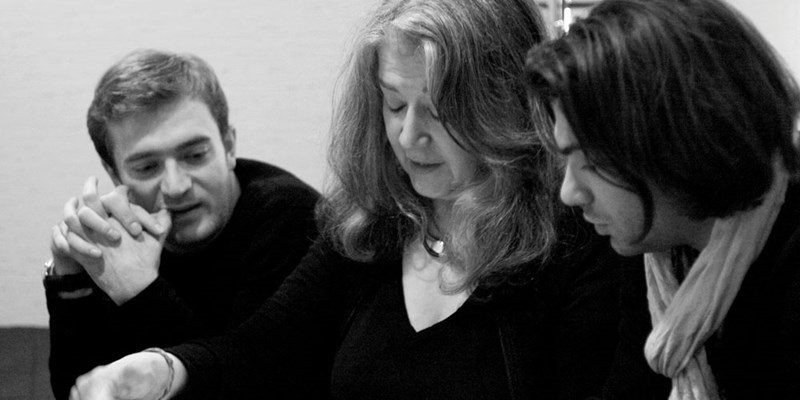
Nurturing young talent: Argerich with the Capuçon brothers in 2008
To what extent this fragility is bound up with stage fright is an open question. It’s clearly an endearing part of her personality, independent of any anxieties, but those close to Argerich understand what she puts herself through every time she goes on stage. Chen has witnessed it more than most. ‘From when she was young she had terrible stage fright. Horrible. She is lucky because the nerves don’t show through her hands, but she does have problems with her legs, which can shake, and it’s extremely unsettling. When she cancels – and this is part of the myth – she does not do so on a whim. She cancels when she truly feels that her body cannot do this. When she was a little girl, before playing she would pray that if she made a mistake she would die – this is the pressure she put herself under. As you can imagine, you don’t get rid of that. This is the cruel aspect of being backstage.’
Goerner also has first-hand experience. ‘One of the more recent concerts we gave was in the Tsinandali Festival in Georgia. I remember how nervous Martha was. When we were going towards the stage, she was telling me, “You know, I don’t feel like the concert is going to happen now, I feel so strange”. I said something a bit banal, something along the lines of, “Martha, we have made this trip, we have been so well received, everyone wants to hear you and hear the concert, and I think at least we can try”. She looked at me seriously, and she said, “You are right, we should at least try”. That changed the mood, and she was so focused – we played much better than we had in the rehearsal. On that occasion the mood switched quickly, but other occasions it will be different.’ Renaud Capuçon sums it up neatly: ‘If she could just press a button and go out and perform then she would not be Martha Argerich.’
Chen confides that, while it’s amazing what her mother can still do, as she gets older she feels more insecure about certain aspects of playing, her real fear being a memory lapse, even in pieces she is really familiar with. Chen relates a rather touching example. Argerich played Tchaikovsky’s First Piano Concerto at the BBC Proms in 2019, conducted by her old friend Daniel Barenboim. This is a work she has played hundreds of times. The West-Eastern Divan Orchestra and Barenboim were on stage, coming towards the end of Schubert’s Unfinished Symphony, immediately before the Tchaikovsky, and Chen went into her mother’s dressing room. ‘Maman was so stressed,’ she recalls. ‘She said there was a passage that she could not remember correctly. She was playing on an electric piano trying to work it out, and she was intensely trying to cope with this stress.’ The orchestra and an audience of almost 6000 were waiting for her, quite apart from a live radio broadcast. ‘She went out and played, and she did not have any memory problems in the performance, but I remember how I felt seeing her like this. I felt so much compassion and admiration – so much respect. Stage fright is still a big issue.’
☆
One obvious safety net is to use the score. Yet this remains conventional only in chamber music. When Argerich plays concertos and – rarely these days – solo works, like most performers she does so from memory. (Yuja Wang has frequently played Bartók’s Second Concerto with the music, and on one occasion when an orchestral player asked her about it, she retorted, ‘Wait a minute – are you not using music?’) Argerich’s decision to stop giving solo recitals almost 40 years ago had less to do with anxieties of memory loss and more to do with a fear of isolation that stems from childhood. For decades now, her primary musical enjoyment has come from playing chamber music with friends, including at her own festivals in Lugano and more recently Hamburg – collaborations happily preserved on a large number of recordings.
Renaud Capuçon appeared regularly at the Lugano Festival: alongside his brother Gautier on cello and Lyda Chen on viola, he plays in a thrilling account from 2006 of Schumann’s Piano Quartet (this despite the problems Chen describes Argerich imagining in the first movement). Capuçon describes an intense musical connection with Argerich that is ‘like a sixth sense – it means we can take risks together, can be free to explore and reinvent the music each time we play with absolute trust in each other’.
On June 25, 2020, as the grip of the pandemic in Europe loosened enough for performances to be streamed from halls without an audience, Capuçon and Argerich stepped on to the stage of the beautiful but empty Grosser Saal of Hamburg’s Laeiszhalle, the usual capacity of which is just over 2000. Their performance of Beethoven’s G major Violin Sonata, Op 30 No 3, and Franck’s Violin Sonata offered a magical example of that invention, connection and trust about which Capuçon talks so appreciatively.
In between came something unexpected. Argerich played Chopin’s Third Piano Sonata for the first time in public since a one-off recital at the Beppu Festival in Japan in September 1995, and gave a performance of breathtaking depth and radiance, with an inner glow that comes with experience and understanding yet with a virtuosity and elegance that belie her age. The nocturne-like second subject of the first movement is gorgeously phrased in a way that, as Colli observed, can’t be imitated. The rubato and subtle phrase extensions feel entirely organic, not at all calculated – here, simply, is a master musician in the heat of inspiration. The same goes for the gossamer-like Scherzo and a Largo of sublime interiority where time feels suspended. It’s extraordinary. The finale shows that Argerich still has all the technique she requires, and after the triumphant B major ending she stands up and gently bows, as if to herself, before gliding off the stage, no doubt relieved this performance is over but one hopes feeling some sense of ecstasy at what has just happened. Perhaps the lack of an audience was somehow enabling; certainly it helped make the occasion deeply moving.
The Chopin was not announced until just before the concert. Chen tells me that it was agreed that if she got to the hall and didn’t want to play it, she wouldn’t have to. ‘She was so afraid,’ Chen says. ‘You cannot imagine how much she prepared this piece for weeks beforehand. She was possessed with it. Suddenly, she went out and she played, and it was stupendous. Afterwards she had no idea whether it was good or not, even though of course everyone was telling her it was fantastic. But the moment she really knew it was fantastic was when Krystian Zimerman wrote to her and said, “This is the best interpretation I’ve ever heard”. And then she was able to say, “You know, actually it wasn’t bad – Zimerman wrote to me and told me so”. There is a real mutual respect there.’
‘If we return to her Hamburg Chopin in 10 years, we will understand the grief and frustrations of 2020’ – Federico Colli
Goerner is also keen to talk about this performance: ‘It was unbelievable. I love the DG recording, the one we all know, but in this performance, so many years later, her cantabile is even more persuasive, full of tenderness and lyricism while losing none of the drama. It was an amazing experience.’ Colli, too, was awestruck. ‘The depth she reached during that performance of the Chopin sonata was the most striking I have ever experienced in this work. The incredible intensity, the sadness … if we return to this performance in 10 years’ time, I think we will understand the circumstances of 2020, the grief and frustrations.’
Chen and I talk about the impact of playing to an empty hall, something musicians everywhere have needed to adjust to. Many relate the strange feeling at the end of a performance, where the sense of exhilaration when something has gone well is rather muted, but for Argerich, Chen sees compensations. ‘You don’t get the feedback from the audience’, she says, ‘which means that you’re facing your own self. In the Chopin, I felt what resulted was an incredible depth and sincerity. Her playing is always sincere, but it doesn’t always reveal this secret interior. We know that she can play with tenderness and beauty, but this went beyond that. She was completely and utterly herself. I’ve never really felt this before.’
☆
I asked the pianists I spoke with to nominate a composer they feel particularly resonates with Argerich, or a recording that was special to them. The responses were varied but interesting. Some were expected – Schumann (mentioned by Grosvenor, Hough and de la Salle), Chopin and Ravel all featured prominently. Chamayou highlighted her Bach. He was greatly influenced by her Liszt and Ravel, two composers central to his own repertoire, but added that, ‘with Bach, to have something to say that is organic on the piano is not easy. For me there are just a few pianists who achieve something special in Baroque repertoire and she is one of them. Horowitz playing Scarlatti is another. Some pianists use big effects and Romantic phrasing which I find out of style; others turn to a kind of Glenn Gould imitation which most of the time is clichéd and disappointing. Argerich achieves something different, with swinging rhythms and magical touch. It’s very fresh and completely alive – it’s incredible.’ Amen to that.
By most standards, Argerich’s repertoire is unusually small. She plays only works she strongly identifies with, and even then is highly selective. Chen tells me that as well as avoiding works that don’t fit with her taste or temperament, Argerich ‘associates some pieces with a personal event or emotion. Some pieces are symbolic of something very personal, so she wants to keep it this way because then it retains its mystery. There are some pieces that she doesn’t touch because of this, because she loves them so much, and other artists play them so beautifully.’ She must be thinking of Beethoven’s Fourth Concerto, the only one of the five Argerich has never played. ‘Yes, exactly,’ Chen confirms, adding an intriguing ‘for instance’.
There are several works Argerich has played only once or a handful of times. Some of these she played when she was young – the Grieg Concerto, Beethoven’s Fifth Concerto and the Waldstein Sonata – while others appeared fleetingly later, including Liszt’s Totentanz (1986) and Second Concerto (1996; both of which are available on YouTube) and Scriabin’s Piano Sonata No 5 (which she programmed in Japan in 1984, although no audience recording or broadcast has ever come to light). Solo Scriabin seems to me a striking omission in her repertoire, but Chen believes that, while early Scriabin is clearly reminiscent of Chopin, whom Argerich loves, much of it is too close to solo Rachmaninov, which she doesn’t (despite the most electrifying account of the Third Concerto, thankfully taped in 1982 during the brief period she played this work). Chen suggests that ‘what she really likes is not melody, but polyphony and rhythm’.
Both Chen and Goerner share that Argerich has been working on pieces she’s never played before, solo works and concertos. The last thing Argerich needs is the pressure of expectation that she will present specific new pieces in public, but they do tell me that she has been working on Tchaikovsky’s Seasons – ‘She loves it’, says Chen; ‘it’s very Schumannesque’. Goerner confirms that Argerich will never play Beethoven’s Fourth Concerto, but reveals that she recently asked him for the score of the Fifth and is very tempted to play it again. ‘She needs to be nurtured by new things,’ he says, ‘so I wouldn’t be surprised if we hear some new repertoire from her, which would be sensational.’
Welcome to Gramophone ...
We have been writing about classical music for our dedicated and knowledgeable readers since 1923 and we would love you to join them.
Subscribing to Gramophone is easy, you can choose how you want to enjoy each new issue (our beautifully produced printed magazine or the digital edition, or both) and also whether you would like access to our complete digital archive (stretching back to our very first issue in April 1923) and unparalleled Reviews Database, covering 50,000 albums and written by leading experts in their field.
To find the perfect subscription for you, simply visit: gramophone.co.uk/subscribe
This article originally appeared in the June 2021 issue of Gramophone.




